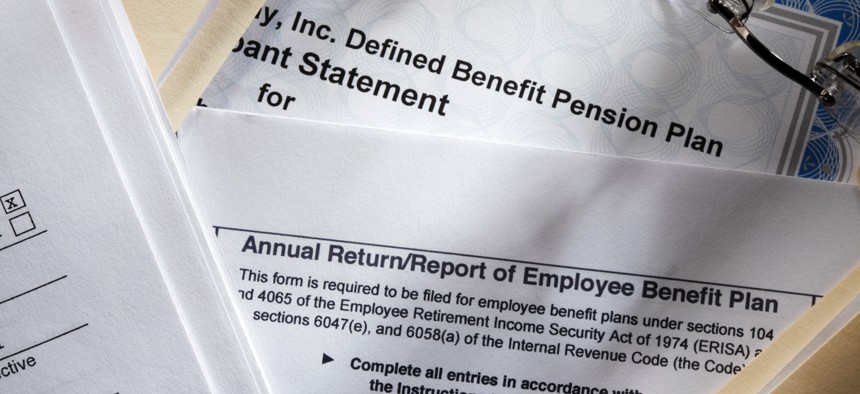
DNY59 / Getty Images
Getting ready to retire
What you should do and how you should approach your retirement and health benefits planning before leaving federal service.
In the months before your transition from federal employee to CSRS or FERS annuitant, you may need a to-do list to help you remember what needs to be done. With so many employees facing early retirement, it may be necessary to condense a six- to 12-month timeline into a much shorter period.
2025 Retirement Date:
Deferred Resignation Program (DRP) 1.0 or 2.0 offer and eligible for Voluntary Early Retirement Authority (VERA)
Reduction in Force (RIF) and are eligible for Discontinued Service Retirement (DSR)
Compute your estimated retirement income
- Ideally, request a consultation with a retirement specialist at your agency through your human resources office.
-
If a one-on-one consultation is not available, then you are on your own. In this case, learn how your retirement is computed (it is only second- or third-grade math), but pay attention to your service history. That’s the hard part! Make sure all your federal service is documented, and you can show the beginning and ending dates of each appointment along with any changes in your work schedule or retirement coverage. If you have missing records, this can cause delays in your retirement processing and may result in service not being credited for your eligibility or computation of your CSRS or FERS retirement benefit.
-
To learn more, check out the resources at www.opm.gov/retire. If your agency is offering retirement training, be sure to sign up. You don’t know what you don’t know!
-
Once you have computed your unreduced CSRS or FERS retirement, consider the potential reductions to your retirement that may include an age reduction for a FERS MRA + 10 retirement, survivor benefit elections for a current or former spouse, court ordered apportionment of your retirement that will be paid to a former spouse, pro-ration of your retirement for periods of part-time federal employment and a possible reduction for the Alternative Form of Annuity if you are retiring with a life-threatening illness. To learn more about reductions that reduce your taxable income and after-tax withholdings, here are some oldies, but goodies to review:
Flexible Spending Accounts: Plan to use up the balances in your flexible spending accounts; you will not be able to participate in the FSA program after you separate from federal service. Health Care FSAs, Limited Expense HCFSAs and Dependent Care FSAs are treated differently if you separate or retire before the end of the calendar year.
-
Your HCFSA or LEX HCFSA will terminate as of the date of your separation or retirement. There are no extensions. Any eligible health care expenses incurred prior to the date of separation will still be reimbursed but those incurred after the separation date are not reimbursable, even if you accelerated your allotments. If you used your entire elected amount before FSAFEDS has deducted it from your pay, you will not be responsible for the remaining allotments.
-
Your DCFSA remaining balance can continue to be used to pay for eligible dependent care expenses until your account balance is depleted or the end of the calendar year, whichever comes first.
-
If you use your entire elected amount before FSAFEDS has deducted it from your pay, you will not be responsible for the remaining allotments.
Set the date and apply for retirement
Learn how to apply for retirement: Request a retirement application package from your benefits office or learn how to submit your request electronically. Review the Application for Immediate Retirement (FERS: SF 3107 and CSRS: SF 2801). According to a recent memo from the Office of Personnel Management, effective June 2, 2025, all federal agencies served by the National Finance Center (NFC) and the Interior Business Center (IBC) must start their retirement cases electronically via OPM’s Online Retirement Application (ORA). If NFC or IBC is not your payroll provider, OPM promises to provide a complementary method for you to submit your retirement electronically. You will receive instructions from your payroll provider or human resources office.
Insurance: Make health and life insurance coverage choices. You must meet certain requirements to continue Federal Employees Health Benefits (FEHB) and Federal Employees Group Life Insurance (FEGLI) benefits into retirement. Your agency will transfer your FEHB coverage into retirement for you if you are eligible. If you are not eligible for FEHB to continue, you may elect to enroll in Temporary Continuation of Coverage. You will need to elect continuation of FEGLI coverage in retirement using SF 2818.
-
FEGLI Handbook (retirement information begins on page 6)
-
Federal Employees Dental and Vision Insurance Program (FEDVIP) and Federal Long-Term Care Insurance Program (FLTCIP): Once BENEFEDS (www.benefeds.gov) receives notification from your payroll office about your retirement, they'll work with OPM to set up premium deductions from your annuity. FEDVIP and FLTCIP premiums can't be deducted from your annuity while you're receiving interim payments from OPM while your retirement is being finalized (sometimes referred to special pay). While you're receiving interim payments, you can pay your premiums by automatic bank withdrawal (ABW) or direct bill. Once your annuity is finalized, deductions will automatically begin from your annuity.
-
If you have not seen a deduction within two months of your retirement being finalized, call BENEFEDS Customer Service at 1-877-888-FEDS (1-877-888-3337) TTY 711.
Thrift Savings Plan:
-
Online Learning: The TSP offers free recorded webinars, live webinars and other scheduled training which cover many TSP topics. These learning opportunities are hosted by the Federal Retirement Thrift Investment Board (FRTIB).
-
Learn about TSP withdrawal options.
-
Consider a TSP Loan or in-service withdrawal if you will need TSP money immediately following your retirement. You cannot take a new loan after you separate from service. If you have an outstanding loan when you separate from service, you have three options:
-
Keep the loan active by setting up monthly payments by check, money order or recurring direct debits. The payment will be changed to a monthly schedule, if necessary; however, the maximum time limit for paying off your loan will still apply.
-
Pay off the loan by the required deadline.
-
Allow the loan to be foreclosed and accept any taxable portion of the outstanding balance and accrued interest as taxable income.
-
Social Security: Are you 62 or older when you retire? Consider your options for claiming Social Security Retirement.
-
If you are a widow or widower, consider claiming Social Security survivor benefits as early as age 60 or any age if you have young children. You may delay claiming your earned Social Security retirement benefit while receiving survivor benefits.
-
Essential things to know about your Social Security benefit: Part 1
-
Essential things to know about your Social Security benefit: Part 2
-
There are more Social Security benefits than you might think
Final days on the job
Now’s the time to tie up any loose ends:
-
Try to obtain telephone or email contacts for your agency’s HR or payroll office, in case you have questions about your retirement within the first few weeks after you leave federal employment.
-
Make a copy of your eOPF as you will lose access to this important record after you separate from federal employment. You must contact your servicing Human Resources office or personnel department within the federal agency or organization you work for to learn how to access this important resource. Here are some examples of agencies that provide instructions for accessing your eOPF:
-
U.S. Department of Commerce instructions for accessing eOPF
-
U.S. Department of Transportation instructions for accessing eOPF
-
National Institutes of Health instructions for accessing eOPF
-
-
Find out when to expect your lump sum annual leave payment.
-
Be sure to notify time and attendance, security and others who may need to know of your separation.
-
Request information regarding any post-retirement employment restrictions. There are laws that may affect you while you are looking for a job. According to the Department of Defense Standards of Conduct Office, for example, you may have to avoid working on certain official assignments while you are seeking or negotiating for a job. Ask an agency ethics official for advice before you take any steps toward getting a job with someone affected by matters that you are working on for the government. Also, if you are participating in a procurement, you may have to file a written report if you contact or are contacted by a bidder or offeror about a possible job -- even if you immediately reject any offer.
-
Be sure to ask questions if there’s any part of the process you don’t understand.
Learn how to navigate your life after retirement
-
Transitions: Making Sense of Life’s Changes William Bridges
-
Investor.gov: Securities and Exchange Commission Whether you’re a first-time investor or have been investing for many years, there are some basic questions you should always ask before you commit your hard-earned money to an investment.







